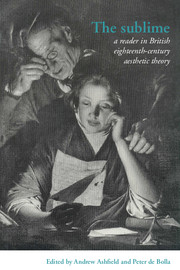Book contents
- Frontmatter
- Contents
- List of Abbreviations
- Introduction
- Part I The Longinian tradition
- Part II Rhapsody to rhetoric
- Part III Irish Perspectives
- Part IV The Aberdonian Enlightenment
- Part V Edinburgh and Glasgow
- Part VI From the Picturesque to the Political
- 41 A dissertation on oriental gardening (1772)
- 42 An essay on the picturesque (1794)
- 43 A review of The landscape (1795)
- 44 The history of the life of William Pitt, Earl of Chatham (1783)
- 45 Enquiry concerning political justice (1798)
- 46 Reflections on the revolution in France (1790)
- 47 A letter from the right honourable Edmund Burke to a noble lord (1796)
- 48 A vindication of the rights of man (1790)
- 49 Letters written in France (1790)
- 50 A tour in Switzerland (1798)
- Sources and further reading
45 - Enquiry concerning political justice (1798)
Published online by Cambridge University Press: 05 June 2012
- Frontmatter
- Contents
- List of Abbreviations
- Introduction
- Part I The Longinian tradition
- Part II Rhapsody to rhetoric
- Part III Irish Perspectives
- Part IV The Aberdonian Enlightenment
- Part V Edinburgh and Glasgow
- Part VI From the Picturesque to the Political
- 41 A dissertation on oriental gardening (1772)
- 42 An essay on the picturesque (1794)
- 43 A review of The landscape (1795)
- 44 The history of the life of William Pitt, Earl of Chatham (1783)
- 45 Enquiry concerning political justice (1798)
- 46 Reflections on the revolution in France (1790)
- 47 A letter from the right honourable Edmund Burke to a noble lord (1796)
- 48 A vindication of the rights of man (1790)
- 49 Letters written in France (1790)
- 50 A tour in Switzerland (1798)
- Sources and further reading
Summary
Book IV. Of the operation of opinion in societies and individuals Chapter V. Of the cultivation of truth
… In the discovery and knowledge of truth seems to be comprised, for the most part, all that an impartial and reflecting mind is accustomed to admire. No one is ignorant of the pleasures of knowledge. In human life there must be a distribution of time, and a variety of occupations. Now there is perhaps no occupation so much at our command, no pleasure of the means of which we are so little likely to be deprived, as that which is intellectual. Sublime and expansive ideas produce delicious emotions. The acquisition of truth, the perception of the regularity with which proposition flows out of proportion, and one step of science leads to another, has never failed to reward the man who engaged in this species of employment. Knowledge contributes two ways to our happiness: first by the new sources of enjoyment which it opens upon us, and next by furnishing us with a clue in the selection of all other pleasures. No well informed man can seriously doubt of the advantages with respect to happiness, of a capacious and improved intellect, over the limited conceptions of a brute. Virtuous sentiments are another source of personal pleasure, and that of a more exquisite kind than intellectual improvements. But virtue itself depends for its value upon the energies of intellect.
- Type
- Chapter
- Information
- The SublimeA Reader in British Eighteenth-Century Aesthetic Theory, pp. 280 - 285Publisher: Cambridge University PressPrint publication year: 1996

